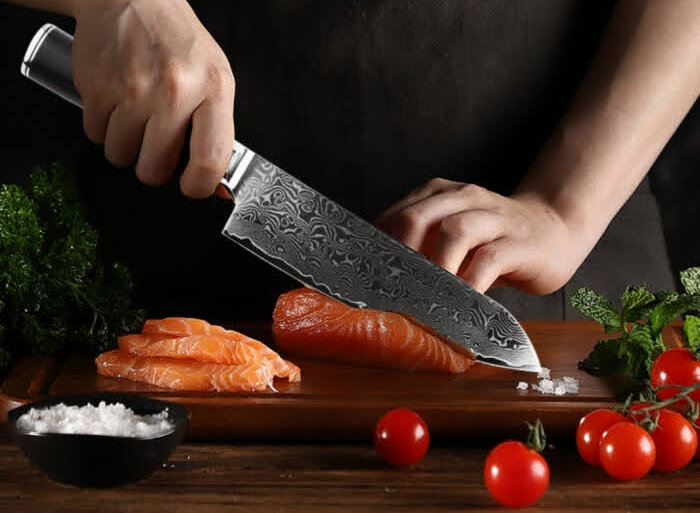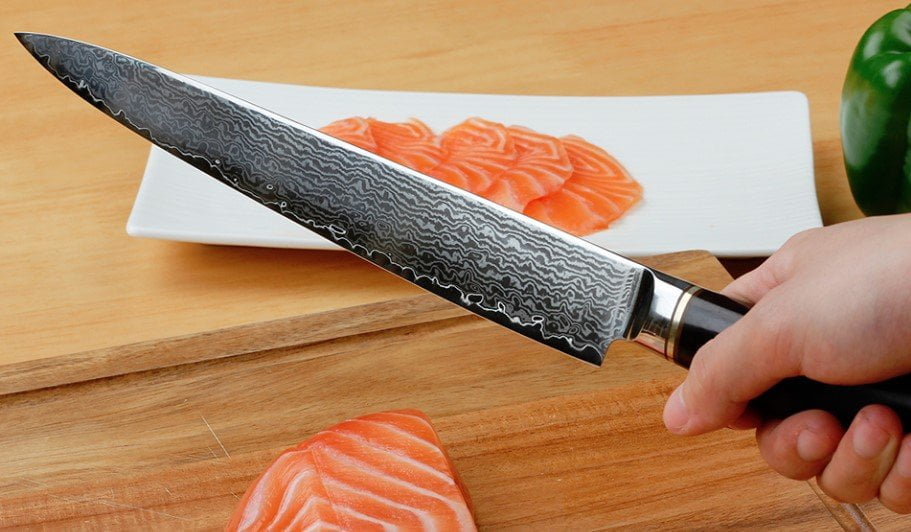The history of Damascus knives is an intriguing tale of innovation and tradition that captures the imagination of kitchen professionals worldwide. These exquisite blades, renowned for their strength, beauty, and legendary cutting ability, have an origin as captivating as their intricate patterns. As we dive into the world of these magnificent knives, we'll uncover the rich past that has shaped their enduring legacy.
Damascus knives are more than just culinary tools; they are a testament to a centuries-old technique that has stood the test of time. From ancient swords to modern-day chef's knives, the journey of these blades is steeped in history and craftsmanship. Understanding this journey provides valuable insights into their cosmetic and functional allure that continues to captivate the gastronomic world.

Origins of Damascus Steel
The story of Damascus steel begins in the Near East, with roots tracing back to up to the 3rd century AD. It's named after the city of Damascus, a bustling trading hub where these blades were first believed to have been crafted. However, the exact recipe and process were often veiled in mystery, passed down through generations of skilled artisans.
Ancient Craftsmanship and Modern Iterations
The defining characteristic of Damascus blades is their distinctively wavy surface pattern, which arises from the blending of different types of steel. This pattern not only enhances its beauty but contributes to the blades durability and sharpness. While the original methods may have been lost to time, modern variations strive to emulate these qualities, making them highly sought after by chefs worldwide.
Knowledge of the original methods has been largely pieced together from ancient texts and surviving blades, bolstering contemporary attempts to recreate these stunning works of art. The connection between these historic swords and contemporary cutlery is a testament to the blend of tradition and innovation that keeps the allure of Damascus knives alive in kitchens today.
The Role of Damascus Knives in Culinary Arts
As kitchen professionals, understanding the historical significance of Damascus knives enhances the appreciation for these tools. Their unique construction allows for exceptional sharpness and edge retention, making them perfect for precision tasks in culinary arts.
Building bridges between past and present, modern Damascus blades are used frequently in high-end kitchens. They embody a legacy of quality and excellence, often becoming a ceremonial item among chefs who take pride in their craft and tools.
Why Modern Chefs Love Damascus Steel
Modern chefs adore Damascus knives not only for their historical journey but for their cutting performance and striking aesthetics. Having a Damascus knife in one's culinary arsenal often indicates a level of dedication and prestige. The intricate beauty and unmatched utility of these blades continue to make them a favorite among professional chefs and culinary enthusiasts alike.
Explore materials used in crafting Damascus knives to further understand their unique qualities.
Myths and Realities Behind Damascus Knives
Throughout history, Damascus knives have been surrounded by myths, often depicted as magic swords with unparalleled sharpness capable of cutting through anything. However, while these stories are intriguing, the true magic behind Damascus steel lies in its metallurgy and the skill of the craftsman.
Over time, the re-discovery and adaptation of this famed steel have led to a resurgence in its popularity, as artisans and chefs alike marvel at both its functional utility and aesthetic charm.
Read about Damascus metallurgy techniques that have captivated metalworkers and chefs.

Conclusion: The Everlasting Appeal of Damascus Knives
The history and evolution of Damascus knives underscore their esteemed position in both historic weaponry and modern culinary arts. These exceptional blades continue to captivate kitchen professionals with their distinctive look and unrivaled cutting ability.
As a timeless piece in any chef's toolkit, Damascus knives embody an enduring legacy of craftsmanship and excellence that spans centuries. The allure of these exquisite blades ensures they remain a prized possession and an enduring symbol of culinary mastery.
FAQ Section
What makes Damascus knives unique?
Damascus knives are known for their patterned steel, which offers aesthetic beauty and cutting prowess, making them highly desirable in gourmet kitchens.
Are modern Damascus knives different from the ancient ones?
While modern techniques strive to replicate the properties of traditional Damascus steel, some differences exist due to evolving materials and technological advancements.
Why do professional chefs prefer Damascus steel?
Professional chefs favor Damascus steel for its sharpness, durability, and the added prestige it brings to their kitchen repertoire.
This article contains affiliate links. We may earn a commission at no extra cost to you.


























